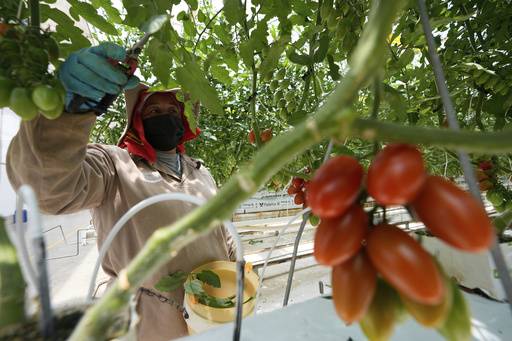Mexican tomato exporter feels impact of Trump’s 17% tariff

AJUCHITLAN, MEXICO—The Trump administration’s imposing 17-percent duty on fresh tomatoes from Mexico has created a dilemma for the country providing more tomatoes to US consumers than any other.
The import tax that began on July 14 has threatened dozens of countries with tariffs, including its critical trading partner Mexico. It comes as the Mexican government tries to also negotiate its way out of a 30 percent general tariff scheduled to take effect on Aug. 1.
While the impacts of the tomato tariff are still in their infancy, a major grower and exporter in central Mexico shows how a tariff targeting a single product can destabilize the sector.
100 tons a week
Green tomato plants stretch upward row after row in sprawling high-tech greenhouses covering nearly 2.4 hectares in the central state of Queretaro, among the top 10 tomato producing states in Mexico.
Climate controlled and pest free, Veggie Prime’s greenhouses in Ajuchitlan send some 100 tons of fresh tomatoes every week to Mastronardi Produce. The Canadian company is the leading distributor of fresh tomatoes in the United States with clients that include Costco and Walmart.
Moisés Atri, Veggie Prime’s export director, says they’ve been exporting tomatoes to the United States for 13 years and their substantial investment and the cost to produce their tomatoes won’t allow them to make any immediate changes. They’re also contractually obligated to sell everything they produce to Mastronardi until 2026.
‘Unaffordable’
“None of us (producers) can afford it,” Atri said. “We have to approach our client to adjust the prices because we’re nowhere near making that kind of profit.”
In the tariff’s first week, Veggie Prime ate the entire charge. In the second, its share of the new cost lowered when its client agreed to increase the price of their tomatoes by 10 percent. The 56-year-old Atri hopes that Mastronardi will eventually pass all of the tariff’s cost onto its retail clients.
Experts say the tariff could cause a 5 percent to 10 percent drop in tomato exports, which last year amounted to more than $3 billion for Mexico.
The Mexican Association of Tomato Producers says the industry generates some 500,000 jobs.
Juan Carlos Anaya, director general of the consulting firm Grupo Consultor de Mercados Agrícolas, said a drop in tomato exports, which last year amounted to more than 2 billion tons, could lead to the loss of some 200,000 jobs.
Artificially cheap
When the Trump administration announced the tariff, the Commerce Department justified it as a measure to protect US producers from artificially cheap Mexican imports.
California and Florida growers that produce about 11 million tons would stand to benefit most, though most of that production is for processed tomatoes. Experts believe the United States would find it difficult to replace Mexico’s fresh tomato imports.
Atri and other producers are waiting for a scheduled review of the measure in two months, when the United States heads into fall and fresh tomato production there begins to decline.
In reaction to the tariff, the Mexican government has floated the idea of looking for other, more stable, international markets.
Mexican Agriculture Secretary Julio Berdegué said on Thursday that the government was looking at possibilities like Japan, but producers quickly noted that the tomatoes would have to be sent by plane, raising the cost even more.

















